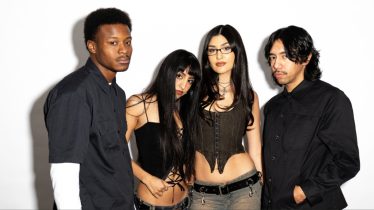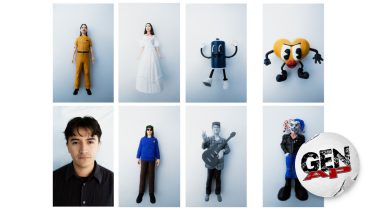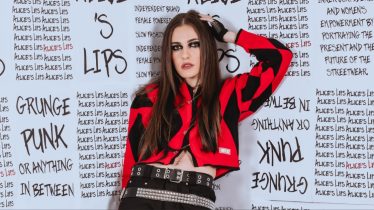
How Daisy Grenade's “ill-fated” run in ‘American Idiot‘ led to collabing with Pete Wentz on “Baby Blackout”
Daisy Grenade are releasing their new song “Baby Blackout” March 25. Alternative Press is bringing you the premiere of the track.
The band are also announcing their debut EP, Sophomore Slump, produced by Pete Wentz of Fall Out Boy and Alex Suarez of Cobra Starship. Ahead of the release, they connected with us to discuss their new music as well as the unique journey that led them to where they are today.
Read more: Avril Lavigne: “Music takes over your whole life; I had to dedicate my entire life to my music”
Brooklyn-based Daisy Grenade comprise musicians Dani Nigro and Keaton Whittaker. The duo’s music is infectious, melding the raw instincts of garage, ‘90s alt and grunge with the polish and chops of pop music and musical theater. Since forming, the band have begun to establish themselves as strong live performers and won a cosign from no less than Wentz, who collaborated closely with them on their new project as a songwriter and producer.
The journey that led to Daisy Grenade is a curious one. The pair originally met while working on a production of American Idiot. When the stars aligned, Nigro and Whittaker came together for one perfect rehearsal… only to immediately learn that the show was canceled due to COVID-19.
Feeling sick of COVID isolation and recognizing shared musical interests, the duo came together to form Daisy Grenade. Fast forward to the present, and the duo have thrown themselves into writing sessions with Wentz, earning their stripes as performing musicians and honing their unique musical sound.
Read more: 15 best punk albums of 2004, from Green Day to My Chemical Romance
The result of that process is “Baby Blackout.” Featuring songwriting by Wentz and production by Suarez, the track captures a messy relationship sustained by drinking. The band pushed the sound in a darker direction from Wentz’s original, using guitars and drums to capture the disorienting feeling of that situation. The end result is a catchy track with a sing-along breakdown and a powerful finish that showcases the duo’s deep understanding of classic ‘90s alt rock.
Check out Daisy Grenade’s “Baby Blackout” below and learn more about the journey that led them from an ill-fated production of American Idiot to collaborating with Wentz and Suarez on their debut EP, Sophomore Slump.
Sophomore Slump tracklist
- MILF
- Baby Blackout
- Say it
- Borderline
- Real Horror Show
What is the story of “Baby Blackout”?
WHITTAKER: Well, “Baby Blackout” wasn’t actually our track to begin with! Pete Wentz sent it to us about a year ago – it was a demo he had written for another project. This original demo was written and produced around 2010, I believe. We talked for a long time deciding how we wanted to update it and make it ours. We actually went through a completely different version before we landed on the one that you’re about to hear.
Our dear friends [Carson Graham and Andrew Callahan of the band Gold St Mkt] produced and mixed a really sick hyperpop version of the song that goes really hard, but ultimately didn’t quite fit with the rest of the project we wanted to put out. So, when we brought it to Alex Suarez [formerly of Cobra Starship, who produced our entire EP], we wanted to find a more cohesive version with the rest of the songs we’d already finished while maintaining the integrity of the song: drawing less from the poppy/hip-hop world, and more from a grunge/rock place, which is where we landed. We drew a lot of inspiration from Weezer on this track.
Read more: Tim Burton’s ‘Addams Family’ reboot casts Christina Ricci… but not how you’d expect
The Pete lyrics really shine through as well. We wanted to lean on how good they were and let them guide the direction we took the production in. The song is about being in a relationship that only works when you’re blacking out together, and we wanted to let the messiness and laziness of that really poke through. There’s a dreaminess about the original demo that we wanted to flip on its head a little to make more of a nightmare. Really loud guitars and really distorted drums to almost disorient you. I love the direction we ended up going in. Alex is a genius, and we’re so lucky to have all these legends working with us on this first track!
Can you talk more about your theater backgrounds and broader music development?
NIGRO: We’ve both been performing and doing theater essentially our entire lives. I come from a family of musicians, so there really wasn’t a chance I wasn’t going to end up somewhere in the performing business. I went to Binghamton University and graduated with a BA in theater, emphasis in acting. And I’m still fully doing the theater thing! My acting career and music career are a positive feedback loop for each other. I feel a lot of my songwriting ability comes from my acting training – I can put myself in another situation that isn’t necessarily the truth of my present moment, and then write from that place in an authentic way, which is much more fun for me personally than always drawing on a personal experience.
As far as other musical inspirations, one of my favorite all-time artists is Regina Spektor. There’s a definite overlap between her music and storytelling, musical theater and the theatricality of classic emo music, and I’m realizing that as I say it now, which is pretty funny.
WHITTAKER: Similarly, I have been doing theater my whole life. I did a Broadway show when I was 12, and it just became my whole life after that. I love the art form, but I’m not huge on the culture that surrounds it. I think it’s propped up by a lot of racism and a lot of sexism, much like most of the entertainment industry. I am finding much more individuality outside of it, but I do hope that if something comes around that I feel really strongly about I’ll be able to be a part of it.
I do think that having a lot of experience performing and acting really helps us in our live shows – obviously, the performance element isn’t so different. As far as other music I really run the gamut. I grew up in Seattle so the grunge stuff was always around: Pearl Jam, Soundgarden, Nirvana, I also really love newer artists like Turnstile and Softcult, who are doing some really cool, fresh stuff in the scene.
Can you tell me more about this “ill-fated” production of American Idiot I’ve heard about? What exactly happened?
NIGRO: Every time this comes up, we have to laugh. I was filling in for a production of American Idiot out on Long Island, and I was playing opposite Keaton’s boyfriend, James. Then, there was a weekend we needed another cover for another part entirely, and Keat offered to fill in, so she came to one single rehearsal before the entire production got shut down because of COVID. We got one music rehearsal together. After we sang together, we turned to each other and just gave each other a look of, “Wow, we sound great together.”
We had never met before that day and didn’t see each other again in person until months into the pandemic, but we became virtual friends and started chatting about music and what it would be like to try writing together, and then our friendship grew, and we were allowed to actually hang out, and here we are. So, we never got to do the show, but we did get Daisy Grenade out of it, which feels like a great trade-off to me!
What led you to start a band?
WHITTAKER: I think the pandemic had a huge hand in it, for sure. We both were really sick of feeling like we had to wait around for someone to let us be artists. So we started talking about the music we listen to and how cool it would be to be able to write that kind of thing. I feel like Dani sat down with her guitar one day and wrote most of the first song we ever wrote called “Undone,” which is not featured on this EP, but hopefully we’ll have a studio version at some point. I contributed with some lyrics, but it just felt easy and really fun. We played a show just the two of us, where Dani played guitar, and I think from then on it was just a done deal. The freedom and the agency it gave both of us was so addicting. I also was beginning to feel a bit like there wasn’t a space for me in the theater, so it felt really good to be creating our own work.
NIGRO: Yeah, it was just so easy and made so much sense. We’re super lucky because we also work really well together on the business side of things, which is great because I don’t think either of us anticipated just how much work goes into running a band. I knew I did not want to be stuck with the responsibility of playing guitar live, and we had a general idea of the sound we were going for, so we knew we were going to have to find some musicians. We lucked out with our boys. They are phenomenal musicians and dear friends, and we love them dearly.
What is your musical vision? There are a lot of interesting aspects I hear in your music, but I really notice that ‘90s element of your sound.
NIGRO: Super stoked that the ‘90s element stands out to you because that’s a really integral part of our project. Something that we talked about a lot while working in the studio was how to keep our sound band-centered. Nothing too overproduced, while not being full “recorded in the garage,” both extremely valid in their own way, however. Our vision definitely streamlined and solidified while working with Alex Suarez in the studio. Performing live is really important to everyone in the band, and I think maintaining that live integrity in our recorded albums is something we’re focusing on.
We’re going for a sound that is balancing between something nostalgic while still feeling fresh and new. We’re obviously influenced greatly by bands like Nirvana, Hole, Garbage and Veruca Salt, but we also really dig bands like Fall Out Boy and My Chemical Romance. I personally have always had an affinity for alternative/rock music, so when I started writing songs for the EP, those were always the melodic elements that would pop into my brain.
The other thing that jumps out to me is your vocals. You’re very dynamic, but I obviously hear a lot of that musical theater quality. It’s interesting because a lot of the punk/grunge spectrum was really trying to undermine the classic vocal stylings of popular music that were partially inherited from theater. Of course, things like pop punk restore a degree of melody, but it’s a complicated marriage. However, you hop across that spectrum in really cool ways.
WHITTAKER: First of all, thank you. Secondly, I think it’s interesting because, since we both come from musical theater backgrounds, there’s no world where those elements don’t come through vocally, but it’s never been a super conscious choice. We’re really inspired by both early 2000s pop punk and ’90s grunge/alt, so blending those two worlds sonically has been a little challenging. I personally connect with the massive theatricality in pop punk. It relies so heavily on storytelling and narrative structure in songs, that it always really drew me in.
Each of our songs also requires a little bit of a different character vocally. I don’t think of them necessarily as literal different people, but they all have a different specific vocal quality they require, for sure. Some feel much more stylized than others, which is because all of our writing feels very informed by the lyrics. I guess that’s the most musical theater thing about us. At the end of the day, I think we sing however we want to sing, which is ultimately pretty punk to me.
You’ve collaborated with and been endorsed by Pete Wentz. Can you talk about working with him?
NIGRO: We’ve been collaborating with Pete for some time now, but it’s still one of those things that we have to pinch ourselves and be like, “Wow, is this really happening?” And as a matter of fact, it is! Pete is incredible. We can tell he’s really passionate about the art he creates as well as supporting and nurturing new artists, like us! He came to a writing session with us while we were in LA, and it was so surreal, but then we were also just sitting there, throwing lyrics and melodies back and forth and working really well together like it wasn’t actually a big deal.
He’s super down to give us ideas or help guide us if we’re not sure of what’s working and what’s not. What’s really great is we’re extremely focused on our lyrics, and that’s his thing, and boy, is he good at it. So getting feedback from the lyric genius himself is super rewarding and inspiring. We’re so grateful for everything he’s been doing for us, and we’re stoked to see what’s next in our collab.
Can you give us a preview of your EP Sophomore Slump?
WHITTAKER: I’m so excited for this project to finally come out. All five of these songs are among the first we wrote as a group. This EP is really about being an early- to mid-20-something and warring with some of these really deep-seated adolescent fears. We wanted it to live in an almost fantastical world that exists a little outside of reality. One of the tracks, “Say It,” is literally about having no idea who you are, but we address it in an almost cheeky way. We’re trying to harness the feelings that you’re told you’re supposed to grow out of and let people know it’s OK to still have them, and also poke fun at those feelings a bit!
It’s a very bratty record that by the end snaps you back into reality a bit abrasively. Sophomore Slump refers to those adolescent insecurities coming back around one more time to haunt you into adulthood. This record feels very us. Straight from our brains to your ears, we hope it feels relatable and cathartic for everybody. Even if it doesn’t, I hope you just scream it in your room.










